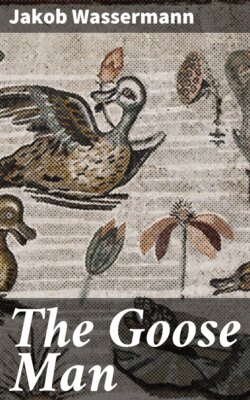Читать книгу The Goose Man - Jakob Wassermann - Страница 44
На сайте Литреса книга снята с продажи.
VI
ОглавлениеTable of Contents
Benda could have sketched Daniel’s face in the darkness: the round forehead, the little nose, pointed and mulish, the rigidly pinched lips, the angular musician’s chin, and the deep dimples in his cheeks.
His ignorance of the musician was complete. Like all scholars, he nurtured an ingrained distrust when it came to the supernatural influence of art. For the great musical compositions which, in the course of time and as a result of the homage of succeeding generations, had come to be regarded as exemplary and incontestable, he had a feeling of reverence. For the creations of his contemporaries he had no ear.
That it was hard to understand and appreciate, he knew. That it was bitter not to be understood or appreciated, he had experienced. That the discipline associated with all intellectual work demands its tribute in the form of sacrificial renunciation needed no proof in his case.
The musician was something new to him. How did he regard him? As a blind man whose soul was on fire. As a drunken man who made the impression of repulsive sobriety on other men. As an obsessed individual who was living an excruciatingly lonely life and was unaware of it. As an unpolished peasant with the nerves of a degenerate.
The scientist wished to find the established and formulated law in the musician—a task that could lead only to despair. The friend surveyed the life of his friend; he allowed the personalities of many young men whom he had met in life to pass before his mind’s eye. He looked for the criteria of common interests; he sought a law, even here. He sat in the dusk, and read from the works of the philosopher Mainländer. Then he laid the book to one side, and said to himself: “The youth of to-day are lacerating, devastating themselves. … It is a fearful age. Measure, proportion, and balance are gone. Every model becomes a caricature. The individual is absolutely dependent upon himself. The flame is without container, and threatens to burn the hand that would check it.”
In Daniel he had found his brother in fate. Music became his brother in torture. On seeing his friend lacerated and devastated, he saw twitch from the eye of Gorgo herself the profoundest of wisdom. But he did not lay bare his own heart.
One night, after unending conversation had brought them both to silence—like ships which, tossed about by the winds, at last drift into the harbour—Benda, taking up with an angry, exasperated remark by Daniel as it echoed back from the other shore of this silence, said: “We must not be vain. We dare not usurp a privilege which has no other basis than our inner task. We must never stand before our own picture. It seems to me that an artist should be of exalted modesty, and that without this modesty he is nothing but a more or less remarkable lout.”
Daniel looked up at once. Benda’s big teeth were visible under his bushy moustache. He had a habit of pulling his lips apart whenever he was searching for a really incisive word.
Benda continued: “The great majority of what you call talent is ignominious. Talent is a feather duster. All that comes from the finger tips is evil. The man who has a distinct goal and is willing to suffer in order to reach it, that man we can use. And otherwise—how beautiful it all is after all! Heaven is above us, the earth is beneath us, and in between stands immortal man.”
Daniel got up, and seized Benda’s hand. There was nothing more vanquishing than Benda’s handshake. His good strong right became a vise in which he shook a man’s hand until it became limp, a perfectly delightful benevolence radiating from his eyes in the meanwhile.
The two men exchanged the fraternal “thou.”
